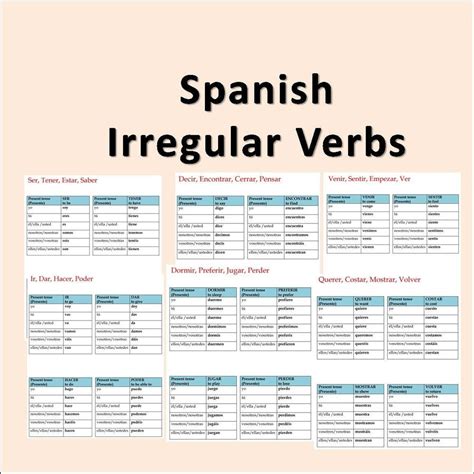What are Irregular Verbs?
Irregular verbs are verbs that don’t follow the typical conjugation patterns in Spanish. This means that their present tense, preterite tense, and imperfect tense forms are different from what you would expect based on the infinitive form of the verb.

Common Irregular Verbs
Some of the most common irregular verbs in Spanish include:
| Infinitive | Present Tense | Preterite Tense | Imperfect Tense |
|---|---|---|---|
| ser | soy, eres, es, somos, sois, son | fui, fuiste, fue, fuimos, fuisteis, fueron | era, eras, era, éramos, erais, eran |
| estar | estoy, estás, está, estamos, estáis, están | estuve, estuviste, estuvo, estuvimos, estuvisteis, estuvieron | estaba, estabas, estaba, estábamos, estabais, estaban |
| tener | tengo, tienes, tiene, tenemos, tenéis, tienen | tuve, tuviste, tuvo, tuvimos, tuvisteis, tuvieron | tenía, tenías, tenía, teníamos, teníais, tenían |
| hacer | hago, haces, hace, hacemos, hacéis, hacen | hice, hiciste, hizo, hicimos, hicisteis, hicieron | hacía, hacías, hacía, hacíamos, hacíais, hacían |
| decir | digo, dices, dice, decimos, decís, dicen | dije, dijiste, dijo, dijimos, dijisteis, dijeron | decía, decías, decía, decíamos, decíais, decían |
| ir | voy, vas, va, vamos, vais, van | fui, fuiste, fue, fuimos, fuisteis, fueron | iba, ibas, iba, íbamos, ibais, iban |
| ver | veo, ves, ve, vemos, veis, ven | vi, viste, vio, vimos, visteis, vieron | veía, veías, veía, veíamos, veíais, veían |
| venir | vengo, vienes, viene, venimos, venís, vienen | vine, viniste, vino, vinimos, vinisteis, vinieron | venía, venías, venía, veníamos, veníais, venían |
Using Irregular Verbs
Irregular verbs are used in the same way as regular verbs. You can use them to express actions, states of being, or events that happened in the past, present, or future.
For example, you can use the verb “ser” to say “I am” or “you are.” You can use the verb “estar” to say “I am here” or “you are tired.” And you can use the verb “tener” to say “I have” or “you have.”
Tips for Learning Irregular Verbs
Learning irregular verbs can be challenging, but there are a few things you can do to make it easier:
- Study the common irregular verbs first. These are the verbs that you’re most likely to use in everyday conversation.
- Use flashcards or a notebook to practice conjugating the verbs. This will help you to memorize the different forms of the verbs.
- Read and listen to Spanish as much as possible. This will help you to get used to seeing and hearing the verbs used in context.
With a little practice, you’ll be able to master irregular verbs and use them confidently in your Spanish conversations.
